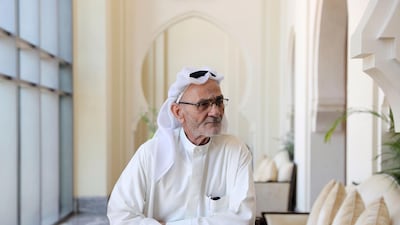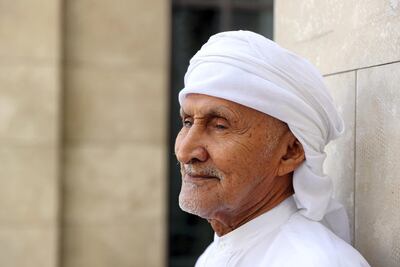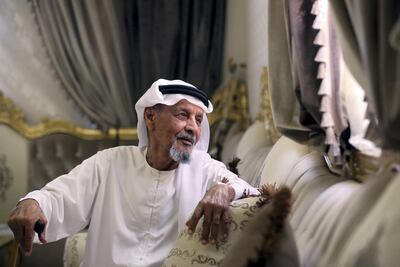They are the elders of society from whom today's young people could learn much.
And as the UAE marked the International Day of Older Persons, the country's oldest generation had one message: "Don’t simply ignore us".
There are up to 700 million people across the globe who are over the age of 60, presenting new challenges for every government.
Along with how to house and provide medical care for them, there is also a need to maintain the connection with society. Loneliness among old people is in many countries now seen as an urgent public health issue to be tackled.
The vast majority of expatriates leave the UAE long before they need living assistance from others, though that may change with the news that new retirement visas are being introduced.
Many Emiratis too require special care as they grow older, and more provisions are being rolled out.
"The Ministry of Community Development maintains a database and communicates actively with 25,000 elderly people in the UAE and gives them great financial and community support," said Hessa bu Humaid, Minister of Community Development.
"In addition to this, it adopted a national value and approach to care for the elderly people for the first generations who participated in building the country."
On Monday, the minister announced a new campaign to recognise the needs of the elderly, named "Your blessing is our duty", and opened a day-care club for elderly people in Umm Al Quwain, the second after one in Ajman. The intention is to expand the centres into a nationwide communications hub between elderly people.
To many young people, community centres may seem to be a relic of the past in this digital age, but for the country's elders, the chance to socialise together, and with the young generation, is a blessing.
"We don’t for need anything. The UAE government has given the elderly everything they could possibly need," said 77-year-old Hafiz Riza, a Jordanian who works for Sharjah's chess and culture club in semi-retirement.
"All we want is to not be ignored or treated like we are senile."
Mr Riza came to the UAE in the 1980s and worked various jobs until he settled in Sharjah.
_______________
Read more:
'This is all because of Zayed': Elder Emiratis tell of lives before unification
Sheikh Mohammed bin Rashid remembers the day the dream was born
Emiratis in private sector should get better pension, FNC members argue
Five-year retirement visas offer hope for long-time expats with an uncertain future
_______________
He now spends his days playing chess at the club and volunteering at the main government-run elderly home in Ajman.
Medical and financial provision are plentiful, but he and others would like the opportunity to pass on their knowledge to young people, who have grown up in a different world.
"All we want is people to talk to us and appreciate us,” he said.
“Don't ignore our opinions, our views, we have a trove of experiences.”
Mr Riza pointed out that simple "chatting" helps to prevent Alzheimer's and depression.
"The mind is a tool and when you don't exercise it, it stops working. That is why we get Alzheimer's and become depressed," he said.
“No one talks to us and most of us don't know how to communicate with the younger generation, through WhatsApp or Instagram or any technology.
“Teach us how to communicate with you — and do not ignore us," he said.
"One day you will age and end up in our situation and you will not like it one bit.”
There are no recent figures accounting for the UAE's older population, but Dubai Statistics Centre estimates they account for 6.6 per cent of Emiratis.
It forecast this will rise to 11 per cent by 2032 and later to 29 per cent in 2050.
Hassan Al Alili, an Emirati in his seventies, and his wife Awatef, 53, volunteer at elderly homes in Ajman and Sharjah.
"He can’t drive any more so I take him,” said Mrs Awatef.
“He goes just to talk to the elderly at the centre and whenever they call us to participate in an activity."
She can see the difference in her husband when they set out for the centre, and said the interaction with friends and acquaintances sharpens his mood and mind.
"When he is back, he tells me that he feels alive,” she said.
"He is happier and so are his friends when they see him."
Getting him out of their home is always a challenge at first.
"In the beginning he always says that he just 'wants to stay home' and starts complaining of different aches and pains, but once he leaves the house, the aches and disappear,” she said.
"The government and the rulers have given the elderly everything — but they can’t force people to speak to us and that is all we need right now.
“Some of the elderly don’t have any family, they need friends," Mr Al Alili added.
On Monday, the ministry said the new centre will offer physiotherapy, social, psychological and health services.
“Wheelchairs and other necessary equipment are also provided," it said.
"The ministry has developed services that cover all aspects of life, including assisting the elderly to live in their homes with their families in a secure and stable environment, as well as sheltering those in need, according to the law of the elderly rights, and providing them with adequate accommodation including food and clothes".
And it acknowledged the need for help to "cope with age-related problems" and medical conditions.
For another retired Emirati, Salem Al Midhani, the community centres of the Northern Emirates are a chance to keep a connection with the community.
A former security guard at a school in Ajman, he is in his seventies but is not exactly sure how old he is — which is not uncommon for the older generation of Emiratis.
Almost every day he visits the centre for the elderly in Ajman.
“I sit with them and we just talk and that makes us all very happy,” he said.
“We have everything — food, clothes and round-the-clock care. We just need the company and people to pass by to say hello."



